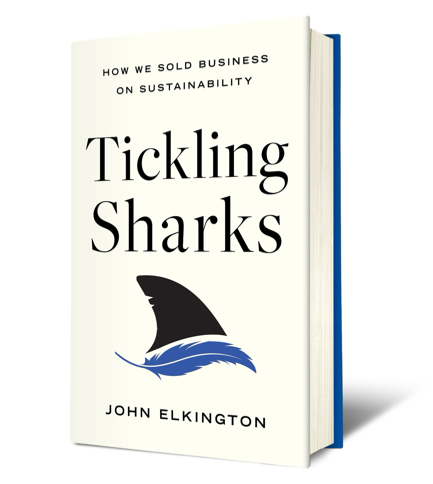So, how do we best speak tomorrow’s truth to powerful people today? That’s the question I tackle in this 10-part series, starting tomorrow, with the first five posts published daily between the 2nd and 6th of September—and the second five between the 9th and 13th of September.
The posts distil a number of lessons I have learned in trying to get major market actors to think and act differently. Specifically, they are based on part of the Coda & Manifesto section of my twenty-first book, Tickling Sharks: How We Sold Business on Sustainability.
Published by Fast Company Press, it uses four marine creatures to symbolize different styles of leadership: the Shark, the Orca (or Killer Whale, an aggressive form of dolphin), the Sealion and the Dolphin.
The idea for this Substack series was suggested by Joshua Domb, founder of Gen-R Law, London’s newest ESG law firm. He listened to the audio version of the book and noted:
If I can offer just one suggestion from an aspiring “Dolphin” to a guiding elder—please think about publishing [key elements of] the Coda, perhaps as a series of ten LinkedIn or blog posts. I listened to the whole book carefully, but I made a point of listening to the Coda twice. The advice was excellent and there are so many young, aspiring Dolphins out there, who would benefit immensely from the suggestions, even if they do not get a chance to read the book in full.
In the event, I decided to develop the series here on Substack, cross-posting to Facebook, LinkedIn and X.
Leaders on edge
By way of context, Tickling Sharks distils lessons learned in half a century of getting close into—and trying to influence—some of the most powerful people in the world. Paradoxically, such people, who can wield immense power, often feel anything but powerful. Instead, they feel profoundly constrained by their circumstances. As a result, they live their lives on the edge—and often over-react when people seem to threaten their interests.
These “Sharks”—the human versions of the much-feared oceanic predators—rank highest in terms of risk to those who now want to change the system, but very low indeed when it comes to partnership potential.
They are monomaniacal, reflexive, driven by environmental signals suggesting other animals are in distress, play zero-sum games, and often succumb to feeding frenzies. As a result, leaders and institutions showing clear Shark-like behaviors must be handled with extreme caution.
They have fought back against the sustainability transition—and more are now doing so as the “ESG recession” bites. Among those showing Shark-like behaviors are the fossil fuel industries, thought to have invested at least $9.77 billion into climate denial between 2003 and 2018 alone.
Power corrodes and corrupts many who are given it—or who have taken it. Even the nicest people change when in power. Strikingly, recent research suggests that power makes people less likely to take advice, even from experts. They struggle to see the world through other people’s eyes.
They are less likely to say, “I don’t know,” even if they sense that doing so would signal honesty and inclusivity. Intriguingly, too, they are more likely to see themselves as taller than they are and to rate their own stories as more inspiring than those told by others.
Tickling real sharks in the wild is at the very edge of the possible. In fact, it’s hard to think of anyone who has managed to train these creatures to do anything particularly useful.
Sharks keep oceans healthy
But science is waking up to the fact that sharks play a crucial role in ensuring the health of the world’s oceans. And just maybe their human equivalents could still help ensure the long-term success and sustainability of tomorrow’s radically different economies.
To anchor this series of posts, I again use the robot I first featured way back in 1991, when I had Financial Times cartoonist Ingram Pinn draw me the cartoon shown below. I have used it ever since, and it features early on in Tickling Sharks.
More recently, I have used the image of the C3PO-like robot on my Substack channel, Rewilding Markets. In the original image, the robot represented the long-term future, whereas over time its meaning has evolved. Today it also refers to the ways in which our technologies are going exponential—and, specifically, to how AI may change the way in which corporate boards and C-suites think, see and operate.
But my conclusion is that the “wicked”—and even “superwicked”—problems the world now faces, which I covered in my previous book, Green Swans, now demand forms of intelligence that only AI-assisted human minds can now provide.
This series of 10 posts launches tomorrow. Meanwhile, any comments very welcome.
John Elkington is Founder & Chief Pollinator at Volans. His personal website can be accessed here.
What readers say:
“Thank you, John, for being our godfather, soothsayer, advocate, provocateur, and—ultimately—inspiration.”
HANNAH JONES, CEO, The Earthshot Prize
Available on Amazon and through good bookshops.







gracias querido John!! Un abrazo
Thank you, I will look forward to the next days of inspiring information.